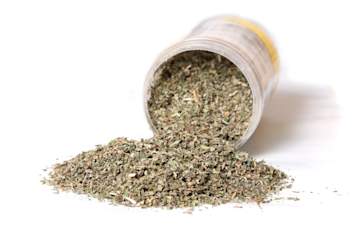
Nepeta cataria, commonly known as catnip, is an herb found within the mint family, known for its often-adorable effect on cats. Many cat toys and cat scratching posts contain catnip to engage and calm cats. For many cats, catnip can be a stimulant, causing them to be hyperactive and get the zoomies, while others prefer to roll around on the ground and relax under its effects. Can cats overdose on catnip? We know catnip is pretty safe for cats, but is catnip safe for dogs?
Can Dogs Have Catnip?
The good news is yes, dogs can have catnip, the very same catnip as cats. Catnip is not toxic to dogs, but it is not recommended for regular use. The active compound in catnip, nepetalactone, tends to have more of a sedative effect in dogs, if it even has an effect at all, compared to the stimulant effect it tends to have on cats.
Catnip does not tend to have an effect on most dogs, but due to its potential relaxing effects, some owners may consider catnip to help calm their dog’s anxiety during potentially stressful times, like during fireworks or thunderstorms. It may also be used intermittently as a sleep aid in pups who are having trouble sleeping through the night. It is always best to consult your veterinarian before introducing any new supplements to your pet.
Alternatives to Catnip for Dogs
While catnip can be a quick, cheap, easy substance to use to calm your dog’s stress or anxiety, it may not be enough to deliver the desired effect. There are a few other over-the-counter options for anxious pups. Calming treats, often containing CBD, can be used, but it is best to consult your veterinarian first as there is a lot of variety to CBD product quality. Pheromone wall plug-ins, collars, or sprays can be useful as well. These products emit “feel-good” pheromones to help make your dog feel more safe and secure in their environment. If options such as these are not effective, consider consulting with your veterinarian regarding additional management options for anxiety in dogs.
Is Catnip Bad for Dogs?
Catnip is best offered in moderation as it does not come without risk. If a dog ingests too much catnip, they may experience stomach upset leading to vomiting and diarrhea. To prevent overconsumption, it is best to only offer about a ¼ to ½ tsp per day to your pup as needed, but not regularly. Catnip and catnip filled toys should be kept out of reach or in a secure storage container to avoid inadvertent overexposure. If your pup gets into an excessive amount of catnip and is experiencing any concerning side effects such as persistent vomiting or diarrhea, it is essential to contact your veterinarian for treatment to help your fur baby feel better quickly. In these cases, you may want to avoid offering catnip in the future.
Veterinary visits can be expensive, especially when your dog gets into something they shouldn’t. Your dog could find that stash of catnip, or they could get into something worse. What if your dog eats chocolate? What about xylitol poisoning in dogs?
A veterinarian may induce vomiting, administer activated charcoal, or provide other supportive care, such as IV fluids, if your dog ingests something harmful. The cost of these treatments can vary widely, but can reach thousands of dollars, especially in severe cases.
As responsible pet owners, it’s important to be prepared for the unexpected. With the rising costs of veterinary care, that means securing protection for vet bills at the time of adoption. Embrace offers comprehensive coverage for injury or illness allowing you the ability to afford the best diagnostics and treatments for your furry friend so you can focus on your pet’s health without focusing on the price tag.
What Does Catnip Do to Dogs?
While catnip tends to have a stimulating effect on cats, in dogs it tends to have no effect or the opposite effect: relaxation. While it may be beneficial in moderation to manage mild anxiety, it can lead to stomach upset in case of overexposure, so it may be best to consider safer alternatives. Consult your veterinarian if you have concerns about anxiety in your pet!